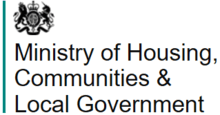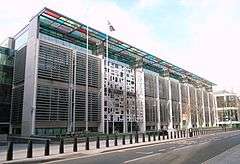Ministry of Housing, Communities and Local Government
The Ministry of Housing, Communities and Local Government (MHCLG)[2] is the UK Government department for housing, communities and local government in England. It was established in May 2006 and is the successor to the Office of the Deputy Prime Minister, established in 2001. Its headquarters is located at 2 Marsham Street in London, occupation of which it shares with the Home Office. It was renamed to add Housing to its title and changed to a ministry in January 2018.
 | |
 | |
| Department overview | |
|---|---|
| Formed | May 2006 |
| Jurisdiction | England |
| Headquarters | 2 Marsham Street, London, England |
| Annual budget | £28.1 billion (current) & £3.5 billion (capital) for 2011-12 [1] |
| Minister responsible | |
| Department executive |
|
| Website | www |
There are corresponding departments in the Scottish Government, the Welsh Government and the Northern Ireland Executive, responsible for communities and local government in their respective jurisdictions.
Ministers
The MHCLG's ministers are as follows:[3]
| Minister | Rank | Portfolio |
|---|---|---|
| The Rt Hon. Robert Jenrick MP | Secretary of State | Overall leadership of the Ministry, Troubled Families |
| Simon Clarke MP | Minister of State | Regional Growth and Local Government |
| The Rt Hon. Christopher Pincher MP | Minister of State | Housing, Planning. |
| The Lord Greenhalgh | Minister of State | Communities, Faith, Fire, Building Safety. |
| Luke Hall MP | Parliamentary Under Secretary of State | Housing and Rough Sleeping |
The Permanent Secretary is Jeremy Pocklington who took up his post on 30 March 2020.
Henry Smith was appointed Parliamentary Private Secretary to the Secretary of State for Communities and Local Government on 26 May 2015.[4]
History
MHCLG was formed in July 2001 as part of the Cabinet Office with the title Office of the Deputy Prime Minister (ODPM), headed by the then Deputy Prime Minister, John Prescott. In May 2002 the ODPM became a separate department after absorbing the local government and regions portfolios from the defunct Department for Transport, Local Government and the Regions. The ODPM was criticised in some quarters for adding little value and the Environmental Audit Committee had reported negatively on the department in the past.[5][6] During the 5 May 2006 reshuffle of Tony Blair's government, it was renamed and Ruth Kelly succeeded David Miliband to become the first Secretary of State for Communities and Local Government at the Department for Communities and Local Government (DCLG). In January 2018, as part of Theresa May’s Cabinet Reshuffle, the department was renamed the Ministry of Housing, Communities and Local Government (MHCLG).
Tenants of the Ministry
- David Miliband 11 May 2005 – 5 May 2006
- Ruth Kelly 5 May 2006 – 27 June 2007
- Hazel Blears 27 June 2007 – 5 June 2009
- John Denham 5 June 2009 – 11 May 2010
- Eric Pickles 12 May 2010 – 11 May 2015
- Greg Clark 11 May 2015 – 14 July 2016
- Sajid Javid 13 July 2016 – 30 April 2018
- James Brokenshire 30 April 2018 – 24 July 2019
- Robert Jenrick 24 July 2019 - present
Responsibilities
The Ministry is responsible for UK Government policy in the following areas, mainly in England:[7]
- Building regulations
- Community cohesion
- Fire services and community resilience
- Housing
- Local government
- Planning
- Race equality
- The Thames Gateway
- Urban regeneration
On its creation it also assumed the community policy function of the Home Office. Ministers have since established the Commission on Integration and Cohesion, and the now separate Government Equalities Office which is now part of the Cabinet Office.
Bodies sponsored by MHCLG
Executive agencies
- Planning Inspectorate
- Queen Elizabeth II Conference Centre
The department also was previously responsible for two other agencies. On 18 July 2011 Ordnance Survey was transferred to the Department for Business, Innovation and Skills[8] and on 28 February 2013 the Fire Service College was sold to Capita.[9]
Non-departmental public bodies
In January 2007, Ruth Kelly announced proposals to bring together the delivery functions of the Housing Corporation, English Partnerships and parts of the Department for Housing, Communities and Local Government to form a new unified housing and regeneration agency, the Homes and Communities Agency (renamed Homes England in 2018). Initially announced as Communities England, it became operational in December 2008. This also includes the Academy for Sustainable Communities. 2008 was also the year that the department along with the Local Government Association produced the National Improvement and Efficiency Strategy [10] which led to the creation of nine Regional Improvement and Efficiency Partnerships (RIEPs) with devolved funding of £185m to drive sector-led improvement for councils.
Devolution
Its main counterparts in the devolved nations of the UK are as follows.
Scotland
- Communities Directorates
- Learning and Justice Directorates
Northern Ireland
- Office of the First Minister and deputy First Minister (civil resilience, community cohesion, race relations)
- Department of the Environment (local government, planning)
- Department of Finance and Personnel (building regulations)
- Department of Health, Social Services and Public Safety (fire services)
- Department for Social Development (housing, urban regeneration)
Wales
- Welsh Government Department for Local Government and Public Services
See also
- Budget of the United Kingdom
- Council house
- Energy efficiency in British housing
- Flag protocol
- Homes and Communities Agency
- Local Resilience Forum
- English Partnerships
- Housing Corporation
- Housing estate
- Social Exclusion Task Force
- Local Government Association
- Regional Improvement and Efficiency Partnership
References
- Budget 2011 (PDF). London: HM Treasury. 2011. p. 48. Archived from the original (PDF) on 4 April 2011. Retrieved 27 August 2014.
- Hansard 22 January 2018 column 19
- "Our ministers". GOV.UK. Department for Communities and Local Government. Retrieved 1 August 2019.
- "Environmental report slams ODPM over sustainable code". Building.(subscription required)
- Knight, Sam (5 May 2006). "Prescott loses his dream home the megadepartment". The Times. London.
- "Government ministers and responsibilities – GOV.UK".
- "Ordnance Survey becomes part of Department for Business Innovation and Skills". Archived from the original on 20 January 2012. Retrieved 9 September 2011.
- "Fire Service College sold to Capita". 28 February 2013 – via www.bbc.co.uk.
- National Improvement and Efficiency Strategy Archived 27 January 2008 at the Wayback Machine
.svg.png)